Do Men’s words affect women emotionally and Mentally?
Misogyny comes in all forms of disguise, just because you don’t hate women doesn’t mean you are not prejudice against women.
The purpose of this article is to show the plight of Gambian women and give voices to the victims, and start an educative conversation with our male counterparts to resolve this issue.
When men talk about females in inappropriate demeaning ways, is it just talk or there’s more to it? Engaging in demeaning talk about women does fit in a measurable extent of expected masculine behavior. It is condoned and entertained among men because, after all, “boys will be boys”.
There are so many examples of insulting ways in which men may talk about women behind their backs and this is deeply rooted in our Gambian society. Women who have experienced rumors of how they and other women have been discussed in inappropriate, offensive terms by men would argue that sexist talk takes a toll, causes emotional trauma and stress .
I and so many other women have being a victim of men speaking of us in a degrading manner, fostering rumors and spreading it like wildfire. I personally will stress over it, cry about it, pray on it, then convince myself he is ignorant and it shouldn’t matter, life goes on. But when inappropriate degrading comments are made by educated men, that are considered leaders in our community, that I have respect for and admired their contribution to our society I knew it wasn’t just ignorance and it was time to speak up.
My questions: what do men gain out of it? Why speak on something you did not witness? How did your life change after an hour or so negative conversation about a female you barely know, never met in person or even the ones that you actually have a relationship with? What positive happened in your life after tearing down that woman? Did your value as a man increase? Did you feel better about yourself? Are you more successful and a lot more happier? Can I conclude you are an ugly hateful person in the inside, or is that just a Powerful mechanism to boost your manly ego.
Moreover the biggest problem is Men do not hold their fellow men accountable for their actions against women. Why? Is it because you are boys and do not want to loose the membership club or are you more concern of your fellow man perception of you and your image. The only time most Gambian Men will stand up for any woman is when she’s blood related.
Our Patriarchal society is more obsessed with policing women instead of checking men’s behaviors towards women. The silence of a man when another man makes abusive, degrading and sexist Statements, rapes, physically abuses or violates women is more of giving your male counterpart approval.
Has humility being lost among Gambians? If a man is trying to get a woman’s attention, and she choose to ignore and not tolerate him, she is label stuck up and rude. To the contrary if she is friendly, courteous and nice it translates she is interested and wants him. But, when a man is rejected, a woman’s name is slandered- he goes around and tell people that he undressed her and participated in a sexual act for his fellow men to consider her as cheap and promiscuous. The only ludicrous behind this move is to decrease her value, meaning if he cannot have her then it’s only important to ruin a fellow man interest in her.
Ostensibly, the worst part is the complete lack of empathy of some men. From my observation if a woman decided to discuss what she is going through with a male friend she is preempted with the following: Why are you bothered when we all know it is not true? Why are you disturbed? Just let it go. This approach, in essence manifest the lack of empathy mentioned above because a woman is not given a chance to share her thoughts and feelings. The result is compounded in psychological distress and well-being of that person. The effects of the trauma sometimes forces a woman to speak up and stand up for herself. If she does, she is considered a terrible person for breaking a so-called brother code and the male reaction is obvious. This shows the behavior has being normalized and accepted among men. Which raise the question if you love your daughters and sisters so much why do you find joy demeaning someone else’s daughter and sister.
Even though Gambia is secular state with Christianity and Islam being the two major religion. Now, even if we look at it from both religious spectrum, slander is a sinful act. “[W]hoever propagates it with their tongues uttering it with their mouth that which you have no knowledge of has committed a sin and the one that listened to it in silence without commenting “it is not right for us to speak of it” has also committed a sin [Sic].(Surah Noor verses 13-17). “[S]lander is malicious lying, and God hates lying (proverbs 6:16-19; 12:22)”
Religion aside, what happened to basic human decency? Why can’t we love and respect each other? Why go to the extreme of hurting someone that haven’t done you any wrong? Is it because women are easy to prey on and considered weak. If so ,then I am reminded of Malcom X speech that “[t]he most disrespected person in America is the black woman. The most unprotected person in America is the black woman. The most neglected person in America is a black woman”. I believe this statement is not just applicable to black women in America but across the globe.
To conclude, I want to see a world where my daughter can grow up in a society that is free from this behavior but importantly where my son can recognize and address such issue head-on without any hesitation.
Part 2: “Diaspora” Blunder, 2016 Coalition Betrayal and The makings of the “political animal”; Adama Barrow
With the regime’s calculating diplomatic appeasements of Jammeh in Equitorial Guinea and the, shameful recycling of APRC, what will the Commission of Inquiry yield but garbabe? “Garbage in Garbage out”. The inauguration of the Truth, Reconciliation and Reparations Commission (TRRC) to address the mountain of human rights abuses of the Jammeh era will ultimately yield the same temporary relief for the “victims” still living in the cesspool of misery and a “slap on the wrist” for the victimizers just as in South Africa, Sierra Leone, Liberia (even as Charles Taylor languish in jail) and to a lesser extent Rwanda and Burundi. The deceptive comparisons of the crisis of the Jammeh era to that of the above countries that had “Truth and Reconciliation commissions” is gross misrepresentation of history. In our specific case, it’s Jammeh and his gang of thugs (National Intelligence Agency -NIA-, the army and the savage “Jungglers) against the rest of us. These commissions are just mere appeasements to give the masses in general, victims in particular the illusions of “justice”. Based on the reckless and erratic actions of the Barrow / UDP regime and its enablers, there is no evidence that these commissions are willing to turn the tables or flip the script and not succumb to business as usual.
If the Barrow / UDP regime has not intervened in the rogue and ganster-like behaviour of the Social Security Housing Finance Corporation (SSHFC), it will be foolish to think that they will intervene else where. Jammeh left us a “9 feet deep” pit, if we don’t stop this insatiable appetite of this directionless regime, we will find ourselves in a “12 feet deep pit”. Consider the oil exploration prospects shrouded in the usual “secret society” approach of the Barrow / UDP regime and the potential disaster in store when the oil starts to flow, they will bury the whole country in abject misery. We are clearly being set up for the kill. We are being sold as “stocks and bonds” again after 500 years to any unscrupulous bidder, in the name of “investments”. The Gambia is not FOR SALE!
The mighty Gambian voters and their “diaspora” allies will lick their wounds and live to fight another day. For it wasn’t for the the diaspora Henry Gomez and Mai Ahmed Fatty will not have been included in the coalition. But once included, they had to make DEMANDS as did all other parties. But we, the “diaspora” with unprecedented political naivety assumed we were dealing with honest and scrupulous partners in the STRUGGLE to flick Jammeh and his APRC over the cliff. A fatal blunder it was.
I can fully remember raising the alarm to make our DEMANDS known to the coalition before the cement was poured for the concrete foundation of the coalition but it was met with adverse naivety that it was the wrong timing. Many thought it would have been offensive or potentially disrupt the fragile coalition. Yet others championed patience but the fatal blow was that, upon victory, the coalition will “do the right thing”. And yes, they sure enough did the right thing by excluding us with a blatant snobbish attitude. In fact the “diaspora” is the enemy as oppose to the APRC vermin they have befriended and in bed with.The frequent volume of calls before and during campaign abruptly ended on December 2, 2016, onwards. So, comrades, brothers and sisters be careful who you coalition with next time around.
Here is what we should have demanded of the coalition, in my view:
1) Voting rights of Gambians in the “diaspora”. Never mind the lame excuse of its too expensive
And that the government cannot afford it.
2) Revocation of the outrageous residency requirement to run for office.
3) Representation in the government and National Assembly.
4) Immediate revocation of the draconian Jammeh laws such as the “idemnity act” and “public
order act”.
It is my strong believe that had we positioned ourselves to become functional representative of the 2016 coalition government in collaboration with the few genuine forces in the coalition, activists, honest intellectuals and indeed the support of the mighty masses, the current madness would have been vigorously challenged and at the least a path charted towards national advancement not selfish personal gains.
THE GENUINE STRUGGLE CONTINUES
Comrades, brothers and sisters, its “Not yet UHURU”, meaning not yet FREEDOM. We didn’t kick Jammeh’s ass out just to remain “suffering peacefully”. To hell with “meaningless peace” and our “new found democracy” which Barrow and his “enablers”, the likes of General Kinteh are worried that it is being abused. No one handed us the long fought victory but the mighty Gambian people. If there are any abuses it is Barrow / UDP regime and its enablers, the police, army and security forces that attempt to violate our democratic rights as was arrogantly displayed during the “Occupywestfield and “Daffadoy” peaceful protests. Barrow / UDP are digging their heels to entrench themselves similar to what Jammeh did but in a shorter period of time. It comes with a sigh of relief to hear people who defended the Barrow / UDP regime expressing how impossible it is to defend the reckless actions of this government. From 2014 – 2016 all eyes were on the Gambia in our relentless fight against tyranny. After 22 years of blood, sweat and tears, we are now more than ever determined to lead the genuine struggle to its logical conclusion; power in the hands of the Gambian people.
But we must be willing to cultivate a revolutionary leadership that is in opposition to neocolonialism and steeped in revolutionary politics. Some reactionaries think revolutionary politics is beyond the grasp of the our downtrodden masses but they are sadly mistaken. The vast majority of our people are disgustingly fed up with “politics as usual”, the politics that the Barrow / UDP regime is operating under.
NO FIVE YEARS FOR BARROW! RESPECT THE MEMORANDUM OF UNDERSTANDING!
“DIASPORA” BLUNDER, 2016 COALITION BETRAYAL AND THE MAKINGS OF THE “POLITICAL ANIMAL”; Adama Barrow
BY: Ousainou Mbenga
It was during one of his “Fakatalu” – tripped speeches, that Barrow characterized himself as a “political animal”, countering the “accidental president” he is believed to be.
ADAMA BARROW, WE WILL “CROSS YOUR LINE”, whether this line is imaginary in your head or drawn on the ground. In fact, you don’t have a “line”, its Jammeh’s line that you are attempting to redraw. Your increasing threats reminding us of the reckless era of Yaya Jammeh will be stopped on its tracks before you become another “run away train” leading us to another wreaking disaster. We will never return to the swamps we just emerged from, come what may. We dared to cross Jammeh’s line more over your “line”.
Unlike the “give them a chance” advocates, we who believe in testing leadership will not allow our beloved Gambia to be submerged again into the cauldron of political treachery being cooked by the Barrow regime, the recycled predators of APRC and the recalcitrant UDP.
In every practical sense, the signs of what the 2016 Coalition was to become were clearly written on the wall and foreheads of the “leadership” and its “surrogates”, both inside and outside the Gambia. One of the earliest signs of “UDP hegemony” was blatantly displayed during the “diaspora meets Barrow” following the impasse. At that meeting Alkali Conteh, Nyancho Sanneh and other UDP stalwarts stormed out of the meeting because they felt slighted by Maila Touray who conducted the meeting. Ousainou Darboe had to go out of the meeting to convince them to come back. This attitude of entitlement was skillfully hidden during the heat of battle against Jammeh’s tyranny, only to surface post “victory”.
Many of us were severely blinded by the venomous slogan “anything but Jammeh”, which ironically was the same caustic popular expression in July 1994: “anything but Jawara”. This repetition, validates the assertion that the required social and political consciousness of our society remains at gutter level, where the neocolonial elite wants it to remain to ensure the never ending viloent cycles of mediocrity and backward ideas steeped in reactionary traditions and religion. The recent reckless promise of building 60 mosques is a continuation of where Jammeh left off in polarizing the secular state that our beloved Gambia have been a champion of.
The “Diaspora” must own up to its political blunder as a significant contributing factor in the outcome of the battle against a fiffth term for Jammeh. But despite all its internal contradictions ranging from the senseless competitions between organizations to the insincerity towards the principles of UNITY that was to make the “coaltion” more resilient and resistant to being easily split and ultimately the betrayal of the century. Indeed the masses of our people were and are still appreciative of the invaluabe contributions from the “Diaspora” unlike the ungrateful opportunists who rode on our backs and ultimately stole the people’s victory. We practically handed victory and power on a gold platter to the Barrow / UDP regime unconditionally without any DEMANDS. Remember, “power concedes nothing without a demand. It never did and it never will”.
In its own doing, the “diaspora” acquired a broad “political blnd spot” which obscured our vision, therefore our ability to evaluate our interactions and dealings with ourselves and the representatives of the “coalition 2016”. We held no one accountable during that process to consolidate the coalition. To this date, there have been no accounting of the resources (money) spend on the campaign leading to the elections. Is it any wonder that the Barrow regime lacks accountability. It is the same people that managed the election campaign that became the administrators of the Barrow regime. This further explains the unscrupulous economic practices that plague the Barrow regime, only 18 months onto the “saddles of power”. The staggering grants and loans from predator “donor countries” (EU, World Bank & IMF) in the name of the Gambian people regularly escape the “transparency, accountability and probity” process until certain members of the National Assembly and the population express their right to know what is being negotiated on their behalf that the spokepersons of the regime scramble to control the damage of not being accountable.The Barrow regime’s lame mantra has become “we inherited a 22 years dictatorship” and “found nothing in the coffers”. No more excuses, we want results. “If you really want to hear our views, you haven’t done nothing”
This is the outcome of “Coalition 2016”, a blatant betrayal of the aspirations of the Gambian people including even those who defend the indefensible. This is also the nature of coalitions, people of different organizations, ideology and political agendas come together to achieve a common political goal. In our case, “No fifth term for Jammeh”! Additionally, coalitions can be traitorous as in our case again, eventhough there was a memorandum of understanding (MOU).
The MOU was the first thing that was thrown out the window followed by the imposition of the “tactical coalition” and finally, the dismissal of the agreed upon “3 year transitional period” as unconstitutional. And now the Barrow / UDP regime and its “enablers” are hell-bent on imposing the “5 year term” contrary to his affirmative “my word is my bond, three years is what we agreed on and I most honor it”. In several recorded interviews on national and international media, Barrow upheld the “3 year transitional” agreement but to the world’s dismay, upon tasting the spolis of “power”, Barrow has inducted himself into the “hall of disrepute” with questionable integrity. In short, the UDP (the “majority party”), after four unsuccessful contests against Jammeh, was forced into the coalition unwillingly but maintained its skillfully hidden agenda. It is important to note that the mighty Gambian voters and “diaspora support” made it cetegorically clear to the “opposition parties” that if there is no coalition, they will stay home on election day and campaign funds will be witheld respectively.
All of these unscrupulous occurences appear too questionable to be coincidental. And rubbing salt on our wounds; the mansions at Mankamang Kunda, FaBB foundation in honor of Barrow’s wife ($752,544 transfered into her account), D11M ( 11 million Dalasis) to the pilgrims to Mecca and a list of at liberty misappropriation of resources while we lack electricity, water and the cruel cost of living with no relief in sight, yet the Barrow / UDP regime added 17 promises upon the previous empty promises one year ago.
In addition, the sham establishments of the Commission of Inquiry turned “Commission of Enrichment”, which recently requested for an extension to unearth Jammeh’s ill gotten wealth will turn out to be just another useless excercise. According to sources, lead counsel Amie Bensouda is being paid D500,000 per month and the commissioners D100,00 per month. Is it any wonder that they requested for an extension?
TO BE CONTINUED
The Gambia’s Transition to Democratic Woundedness: We are Reaping What We Have Sewn:
Alagi Yorro Jallow
Gambian, care to Listen to a pertinent sermon from Pope Francis? “Power is like gin in an empty stomach. You get drunk, feel dizzy, lose your balance – and hurt those around you”. As Gambians, we really ought to remain one, united, indivisible Gambia where justice is our shield and defendant and, where people live peaceful, harmonious and productive lives: If some of our religious and political class are fostering such deep divisions, partisanship and intolerance, who will unite this country?
Pluralism, peace and harmony that the Gambia enjoyed since independence is not godsend. This peace is borne of a culture we have built, a culture of mutual respect and tolerance amongst our people irrespective of one’s caste, tribe, religion or political orientation.
Political competition should not, and must not be concerned as platform for animosities, threats, and posturing, that jeopardize our country’s long cherished peace.
All this grand posturing doesn’t well for the Gambia. For it gives some feelings to our peace-loving people that we are a nation heading for serious trouble.
We hope that our leaders and in politics, civil society and religion will see the need to reason together and ensure we don’t jeopardize our country’s peace and security.
Every Gambian who cares about the country and its future cannot ignore the bigotry, casteism, tribalism, religious intolerance, misogynism, narcissism unfolding in our country daily crossing a line with dangerous potential.
Since at the ending of dictatorship, in the throes of the Gambia’s transition to democratic woundedness. Now I find anchor again as we go through the woundedness of Gambia’s politics that have come with so much anger oozing out of unhealed scars, and malignant hate. There are dangers so perfectly reflect the storm brewing over a young nation struggling to hold itself together, but daily surrendering to the savage seduction of propaganda, the spread of malice, the rejection of what is true, and using God to stamp every prejudice and loath for fellow humans.
Gambians should commit themselves to telling the truth, as much as they have the light to see the truth. This is the age of lies, and it is getting worse. We are reaping what we have sewn: debased journalism; an internet where any assertion passes as fact; a disdain for education; the mockery of independent thinking, a pandering to anti-intellectualism; the ossifying of political opinions and letting them pass for “truth;” an embrace of racism ethnic bigotry, xenophobia northernizing, patriarchal privilege political privilege, and brute force as a means of doing politics.
There is no issue in the entire thesaurus of human activity that is not at some level a spiritual issue. That behind all our problems, including the suppression of truth, is a refusal to accept our own complicity in living falsehoods, and our reluctance to become conscious of our connection with everything–every single thing–in the universe. Instead, we imagine ourselves to be superior to other species, to be the gods of creation, the “stewards” of nature with which we can do whatever we please. Within our own species we view ourselves as locked in a contest to see who can amass the most power to manage and manipulate others.
As Gambians, we must commit ourselves specially to challenge religious falsehood where we see it. That opens us up to the criticism of being arrogant, self-righteous, judgmental, and guilty of the same ills which we would point out in others. We must know that and accept that. And if we should prey upon a brother or sister for the speck he or she has in his or eyes while ignoring the log we have in our own, All Gambians should and must be called out. We must submit ourselves to that criticism. Moreover, we should commit ourselves to an honest self-examination and an openness to accept our limitations and our errors to the extent we able to do so. We must be and remain to be held in mutual accountability for facing and telling the truth.
By any objective analysis, this is a new low and unprecedented in our politics. This is no longer about policy, civility, decency or even temperament. This is a direct threat of violence against a political rival. It is not just against the norms of Gambian politics, it raises a serious question of whether it is against the law.
Our religious and political leaders will undoubtedly issue an explanation; some of their surrogates and followers are already engaged in trying to gloss it over, but once the words are out there they cannot be taken back. That is what inciting violence means.
To anyone who still pretends this is a normal politics, history is watching. And sooner or later the suspects, its verdict will be harsh. Many have tried to do a side-shuffle and issue statements saying they strongly disagree with rhetoric but still support the perpetrators of these divisive hate speeches on social media. That is becoming woefully insufficient. The rhetoric is the politician and their followers.
This religious, tribal, casteism, bigotry and intolerance cannot be treated as just another outrageous moment in our politics. We will soon know whether anyone who has publicly supported these hate speeches explains how they can continue to be silenced without any condemnation of such hate speeches.
The Gambia is a democratic republic governed by the rule of law. We are an honest, fair and decent people. In trying to come to terms with today’s discouraging development the best is to remind Gambians about inspirational words of one greatest political poet Abraham Lincoln for perspective:
“We are not enemies, but friends. We must not be enemies. Though passion may have strained it must not break our bonds of affection. The mystic chords of memory, stretching from every battlefield and patriot grave to every living heart and hearthstone all over this broad land, will yet swell the chorus of the Union, when again touched, as surely they will be, by the better angels of our nature.”
The problems that bedevil the Gambia have not just surfaced from a flawed Constitution but are mostly the results of flawed politicians who get away with impunity. Of course, the flawed rent seekers in oversight bodies employed to protect public interest have failed the integrity test, too.
Let Gambians dialogue but let us not pretend that legal reforms alone are the panacea to all our ills. Let us deal firmly with those who ride roughshod over the laws that we have. We need moral reform as much as legal reform.
Does the Barrow Household Need a Movement and Foundations?
Omar Janneh
In my view, President Barrow does not need a foundation and or a movement, and to have both must cause unacceptable and unnecessary flow of distractions. President Barrow already has a foundation which I will call “Building a Just and Prosperous Gambia Foundation”. This is the Foundation we elected him to work on, so he should have no time and no business setting up another foundation/movement or encourage anyone to set up any foundation or movement in his name while in office.
Some questions for the Barrow Youth Movement and Foundation:
- What are the sources of income for the Barrow Youth Movement and Foundation – how does it raise funds to support its activities?
- What is the President getting out of the Barrow Youth Movement and Foundationand could there be a case for conflict of interest?
- Who are the signatories to the Barrow Youth Movement and Foundation’s account?
- Who is the Youth Movement and Foundation’s Accountant/Treasurer and who are the trustees?
- Who have been the beneficiaries of the Barrow Youth Movement and Foundation’s work?
- If the country’s Financial Intelligence Unit is not dead, can it report on any of the financial transactions of the Barrow Youth Movement and Foundation?
If the President’s wife, Madam Fatoumatta Bah-Barrow wishes to set up a Foundation, I think it is important and proper that she is knowledgeable about setting up foundations and that she must ensure that she has people working on the Foundation who are knowledgeable, e.g., on how to manage a Foundation, and how to legally raise funds to support the Foundation’s work. It seems that the public deserves a better explanation of how and why Madam Fatoumatta Bah-Barrow Foundation(FaBB) accepted the reported $752,594.42(D36,123,000) into the Foundation’s UK Guaranty Trust Bank account in 2017 from TBEA Co. Ltd(Chinese Company that is reported to manufacture power transformers and develop transmission projects) and the subsequent mysterious bank transactionsfrom the Foundation’s Guaranty Trust Bank (UK) Limited London Bank account into a Portuguese Bank Account, Novo Banco to supposedly charter a flight to China using White Airways(Portuguese Charter Airline in Porto Salvo). It should be a concern that these seemingly dodgy financial transactions are linked to the President’s household. Could Madam Bah-Barrow and her husband be abusing the office they occupy? For us to be told by the FaBB Foundation’s Vice Chairperson, Fatou Ceesay, that such questionable money transfer(s) would be investigated by the Foundation’s Board of Directors(insiders) will be an exercise drenched in futility. I suppose they want to use the “expertise”in-house to investigate self. Hopefully the gullibility genes will be in full swing when Foundation’s Board of Directors report their findings and they will be believed.
We need to know the truth about the financial transactions of the FaBB Foundation. It is very doubtful that the Foundation’s Board of Directors will answer the following questions, but they are listed below:
- We probably know one source of income for the FaBB Foundation, but could the Foundation’s Board of Directors tell us the Foundation’s other sources of income?
- Who is the Foundation’s Accountant/Treasurer and who are the trustees of the Foundation?
- What does Madam Fatoumatta Bah-Barrow gain from her Foundation?
- Who are the signatories to the FaBB Foundation’s account?
- What do/did ordinary Gambians gain from any of the (legal) activities of the FaBB?
- How much does the President know about the (seemingly) dodgy bank transactions of the FaBB Foundation?
- Could the Financial Intelligence Unit shed any light can on the reported financial transactions of the FaBB Foundation?
- Why should we trust the findings of conflicted individuals in the FaBB Foundation investigating alleged wrongdoing of the Foundation they work for?
- With the President and Madam Fatoumatta Bah-Barrow both having Foundations, could there be any duplication of effort, and if so, what effort – to enrich themselves; empower a few of us or both?
You probably recall the donation of some money by “anonymous” donors through the government of Saudi Arabiato Gambian pilgrims this year. Without getting into the logistics of how “anonymous” individual(s) make donations to their government for onward payment to another government’s pilgrims, how and why would a government that claims that it shall deliver good governance by being accountableexpose itself to such dodgy transactions? What does this say about our government? The relevance of mentioning this here is that this government does not seem to have the knack for judging and avoiding (strategic) weaknesses; they seem clueless on what resources to take or not to take which may be a good fuel for mistrust.
I think it is plausible that the Barrow household could be funding, in part, their supposed foundations using some of the donations from such “anonymous” donor(s), for favours which may not be in the national interest. Further, the Barrow Youth Movement and Foundation and the FaBB Foundation may also lend themselves very well to pilfering from the public purse. To avoid a national embarrassment, the Barrow Youth Movement and Foundation and the FaBB Foundation must be shut down immediately and Parliament must not allow any such Movement or Foundation to be set up by them or by anyone in their name. Given what we know already – from the previous and current governments, the CRCmay need to consider whether a serving President or anyone in the President’s household needs a Foundation/Movement. We urge the Commissioners on the CRC to consider their legacy and do the right thing for The Gambia.
Knowledge Beats Ignorance Every Time: The Case for “Formal Education”
The current debate about the importance of “formal” education in The Gambia reminds me of the incredibly brilliant Malcolm X, towards the end of his life, searching for knowledge. Malcolm was one of the greatest minds of the past century. I grew up a total Malcolmite (Black Nationalist) — but the academy turned me towards Baldwin, Hurston, Judt, Said, Sen, Davidson — towards humanism. Interestingly, Malcolm, after his pilgrimage, left the nationalism of his early years and became an informed humanist.
Like a good many of his interlocutors, Malcolm was an able debater, a bright mind for someone who dropped out of the ninth grade. He did not have the best of a formal education, and knew that a ninth grade education was insufficient for someone who endeavors to be a thinking person. But boy, was he a capable autodidact. Malcolm noted some of his shortcomings as a public thinker — noting:
“My greatest lack has been, I believe, that I don’t have the kind of academic education I wish I had been able to get—to have been a lawyer, perhaps. I do believe that I might have made a good lawyer. I have always loved verbal battle, and challenge…You can believe me that if I had the time right now, I would not be one bit ashamed to go back into any New York City public school & start where I left off at the ninth grade and go on through a degree… Because I don’t begin to be academically equipped for so many of the interests that I have. I would just like to study. I mean ranging study, because I have a wide-open mind. I’m interested in almost any subject you can mention.”
But time raced ahead of Malcolm and he died not knowing — knowing how much he did not know, so it goes for us all.
Personally —I was the kid in high school that would seem to know the answers to all the questions in class and flunk the test because I thought being an autodidact — I was, somehow, invincible. Structure is important. Discipline is important. I lacked both.
I love knowing. The knowing is its own reward. The ability to frame the question is its own gift — even if you cannot quite name the answer. By the seventh grade – I have already read Sam Sarr’s opus — “Meet Me in Conakry.” By the time I entered St. Augustine’s —I would spend countless hours reading prose from the New Yorker, the Economist, Ayn Rand, Fanon — and by the end of my tenth grade — I have already mastered the world map. I could tell you every country in the world, every country in Africa, Asia, every state in America ( I just loved America ), every province in Canada, the Antipodes and their capitals. I have read all of Shakespeare’s tales, Ngugi — and read the encyclopedia with zest, on my own volition. I spent hours debating with folks who were ten-plus years older than me in my old neighborhood – and held my ground.
Personally and intellectually — these experiences were profoundly invaluable; however, I loathed the structure of a classroom, I lacked discipline, I was all over the place. The academy, writ large, gave me that structure and discipline. It made me synergize many things I have read in my early teens and it challenged me. It was rigorous — provided me with the skills to conduct quantitative and qualitative research —how to put my ideas to the test— just to name a few. It also afforded me a life, in a country — the United States — that values “formal” education — that, a 15 year old me in Churchill’s Town never have dreamt of.
I do not know about you, but for me — I want those operating on me; those pulling my teeth; those tasked with transforming our subsistence agricultural system to meet the demands of the times; my economists; educators; policy makers; our legal minds and luminaries; I want our children, the ones that are going to “Invent the Future” — to be formally, properly trained and equipped. The society of the 21st century, my comrades, is the educated one.
Essentially— lest we forget that the many vexing issues facing The Gambia — poverty, schooling, women’s issues, healthcare, infrastructure, agriculture et al. — cannot be discussed without discussing “formal” education. For what it’s worth, it is a great launchpad, it is definitely not the only one nor is it a silver-bullet, but it is a very solid and rewarding one, nonetheless.
To that end, read, discern, parse, question everything — but equally important — get yourself a “formal” education, if you can. I kid you not — it is a rewarding, enterprising, challenging journey. On the whole — knowledge beats ignorance everytime.
— Saul Njie
08.20.2018
Recommendations Made For Senegal To host The Youth Olympic Games 2022
Omar Jarju
The IOC Executive Board (EB) Friday made the decision to propose Senegal as host for the 4thSummer Youth Olympic Games (YOG) in 2022. The host will be elected by the IOC Session in Buenos Aires. This proposal is based on the report of the International Olympic Committee (IOC) Evaluation Commission, chaired by IOC Vice-President Uğur Erdener, who said:
The candidature is centred on three locations: the capital city, Dakar; the new city of Diamniadio; and the coastal resort of Saly. Senegals project is tied in with the West African countrys overarching development strategy, notably the national governments Emerging Senegal plan, which envisions major economic and infrastructure improvements.
IOC President Thomas Bach said, It is time for Africa Africa is the home of many successful and prominent Olympic athletes. Africa is a continent of youth. That is why we want to take the Youth Olympic Games 2022 to Africa and to Senegal. They have offered a project based on a strong vision for youth and sport. There are many opportunities, and we will endeavour to deliver together, as part of a strong partnership, visionary, responsible and inspiring Youth Games.
In PyeongChang, the IOC Session in February this year unanimously decided that the next edition of the Youth Olympic Games in 2022 would be awarded to the African continent.
The process has been collaborative, and the IOC was impressed by the quality and thoroughness of each partys submissions. The IOC would like to particularly praise the level of involvement and positive response of all four NOCs and the public authorities concerned.
The Youth Olympic Games 2022 in Africa will make history as the first Olympic event on the continent. The Host Selection Process was shorter than previous processes, and reduced cost and complexity for the Interested/Candidate Parties.
Considering the unifying power of the Games, the IOC is pleased to count on the four parties, which all promised to endorse the decision of the IOC and pledged full support to the selected host.
Following the IOC Sessions endorsement and the signing of the Host Contract in Buenos Aires, Senegal will enter a Co-construction phase with the IOC to build the detailed Senegal 2022 Edition Plan.
The IOC Session will convene on 8-9 October 2018 in Buenos Aires.
Marie Atouta Senghore: The Girl Who Is Never Afraid To Pursue Her Dreams

As a child, she did of course tried other artistic areas such as dancing, singing and even painting but acting always stayed with her. Her passion for acting during her tender years would see her featured in commercials and a children’s television show.
“I remember how much I loved being on set and filming. I have been in love with the idea of making it my career ever since,” she said in an interview with JollofNews.
Coming from African family that values the importance of education, Marie took a “break” from acting when she entered middle school and focused on education. However, the passion for acting never left her.
She added: “When I had the option to pick my major in high school, I knew that I wanted to get back into acting. So I attended Stockholm’s Estetiska gymnasium and majored in Theatre.”
After her graduation, Marie again took a break, flew the nest and moved to Tenerife, Spain to map out her plans in life.
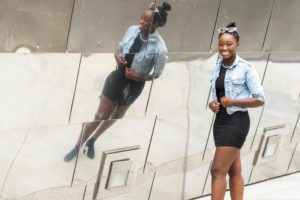
“I needed some time to figure out what my next step in life was going to be. I had a very big desire to travel and see the world, but I still wanted to follow my passion and continue acting,” she said.
But as Elvis Presley said in his famous song Home Is Where The Heart Is, Marie moved back home and started doing background work. It was not easy at the beginning, but Marie knew that success in life only comes through hard work.
From a young age, she was reminded by her parents that she is beautiful and intelligent and can be what she ever wants to be in life if she works hard for it. Her parents also reminded her that life is full of challenges and she must always dare to dream big, set a vision and not allow her critics and fears to cloud her judgement. With that in mind, Marie’s determination eventually landed her a few small roles in short films.
More opportunities soon came knocking and she landed her first big part in Daniel di Grado’s feature film “ALENA”. She also landed her first leading role in the Tine Alavi’s short film “ALIKI” and in some parts in commercials.
She said: “After I came back from Spain, I didn’t have much adult experience in the industry nor did I have an agent. Although I had a couple of gigs under my belt, it was quite hard at first. I didn’t know where to start so I just signed up on some page and did background work. I noticed that I would get cast as background often, but I rarely found any speaking parts for me.
“Of course, I was very aware of the industry that I was entering. I had not really seen any dark-skinned actresses in Swedish media before and although it was daunting to try to push my way through a mostly white industry, I knew that it was the only way. I kept at it and luckily met some amazing people who wanted me in their films.”
With her career beginning blossom, Marie decided to move to the Los Angeles, Califormia, the City of Dreams and the entertainment capital of the world in order to reach her full potential.
It has always been her dream to live and work in the city which has got some of the world’s best-known and most iconic landmarks and attractions including the Hollywood Sign.
“If I remember correctly, I started planning my move to Los Angeles when I was nine- years-old,” she said.
” Already I knew that my career could only go so far in Sweden, so the idea to move to the “center” of the film industry was always there. I am really glad that I did. I have met and worked with so many amazing people from around the world and it has truly inspired me to travel more and work on projects in different countries.”
Today, Marie has starred in a number of films including ALENA, ALIKI, First Try, 6:00 PM, Loving you Hurts, Jason’s Memory, 1989, SALT, Barriers and Tackla.
She also starred in the popular film, Shea Buttah which won the “Best Narrative Short” title at the Black Laurel Film Festival. The film is also in talks to be screened at the Gambian film festival “Cinekambiya’.
Marie is currently planning to shoot her first self-written short film, which according to her own admission is going to be a very growing experience.
“I literally cannot wait. And since I have been labeled as in “international” actress, I plan on continuing studying Korean and Japanese, and hopefully be able to work on more films internationally,” she said.
Despite her success, Marie has remained humble and modest. She attributes her achievements to her parents, friends and family.
She said: “I have been so lucky to have had the support of my friends and family. My parents were always very clear about what they wanted me to do with my future, but they were ALWAYS supportive of me following my dreams. I still contact my close friends and family whenever I get cast in a new project and they always send me their support.”
Her best online presence is her Instagram @senghore where people can see more of her and follow her journey in the movie industry.
Marie’s achievements has also not gone unnoticed in the Gambian communities in all parts of the world.
“One of the reasons why I love being a Gambian actress is because I can actually see the support of our community, she added.
“I have aunties, uncles and cousins from around the world who reach out to me and congratulate me on my success. It’s so wonderful and it really makes me happy. It might be a small thing, but it means so much to me.
“I have been so lucky to have been able to follow my dream and I hope that anyone who wants to pursue this career, does too. But I would like to leave with this advice.
“This industry is rough. I am not saying this to scare you off, I’m saying it because it’s true. You can be the best at what you do and still not make a career out of it. Only enter this industry if you are one hundred percent sure that it is what you want. And if you do decide to enter, be yourself. Be that little piece of magic that makes other people want to work with you. It’s hard, but not impossible.”
D3.5M budgeted for Gambia-Algeria game
The Gambia Football Federation (GFF) will spend D3.5M on The Gambia-Algeria game, The Fatu Network has gathered.
The Scorpions will host the Desert Foxes of Algeria this Saturday at the Independence Stadium in Bakau, in the 2019 African Cup of Nations Qualifiers.
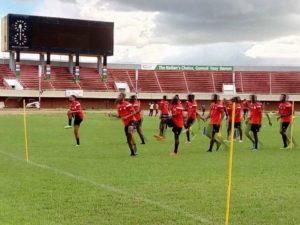
The Gambia is in the same group with Algeria, Benin and Togo. The Scorpions were beaten 1-0 by Benin in their first outing last year in Cotonou.
The D3.5M covers air fares for the foreigner-based players, allowances and lodging among other logistics for the game.
The GFF, as gathered, is solely funding the game in addition to the Coach’s monthly salary.
The GFF say tickets for the match is pegged at D1000 for VIP, D100 for covered pavilion and D50 for uncovered pavilion.
The funding of national teams and payment of Coaches’ salaries should be the responsibility of the government through the Ministry of Youth and Sports.
However, the Ministry has not been fulfilling this due to what officials say is the lack of adequate funds to support the national teams.
Despite government’s absence in funding this game, the new Sports Minister Hadrammeh Sidibeh is said to be giving morale support to the teams. He has been seen at the team’s training session interacting with the Coach and players.
Unlike Algeria, Gambia has never qualified for this continental competition.
How to combat tribalism
I am wondering what went wrong in our public discussion. I am saddened that all of a sudden the citizens of a country which was always known for its tolerance and discipline are becoming paranoid concerning tribes and ethnic matters. I am puzzled that you can no longer make a mild joke about tribes in the Gambia. Are we slowly sleep-walking back to medieval times?
If so, we immediately need to wake up otherwise socially as a nation we are doomed to fail. I cannot imagine us pulling and pushing one another just because of our ethic and tribal differences. I am disappointed that instead of promoting the brotherhood of one nation, we are distracted by the actions of a few political agitators in our midst. In the past few days, social media went mad following the utterance of one irrational individual, whose dubious intent was to tear us apart by unleashing all his frustration against just one particular tribe.
My fellow citizens, let us allow the law to take its course, and move on with our lives. Our strength genuinely lies in our unity. The effort of our ancestors is the foundation to our social and ethnic fabric, which has bound us together for many centuries, and projected a positive image of the Gambia to the outside world. I encourage every citizen to continue to nurture that unity and safeguard it for the benefit of the next generation. The virtue of that unity is manifested in many ways. The wider world views the Gambia as a country which is known for her peace, tolerance, harmony, love and humour. Consequently, she has earned the title of “the smiling coast of Africa”.
There is no single tribe which can claim ownership of the Gambia: she belongs to all Gambians. Due to intermarriage, the blood line of the majority of Gambians has been diluted with that of other tribes. By way of example, I am Gambian, and a Mandinka. My wife is Fulla, my fathers’ best friend is Sarahuli, my dearest neighbour is Wollof, my uncle’s wife is Manjako, my main admirers are Jolla, and my newest friend is Sarere: There is no room for tribalism! I believe that this would be the case for most Gambians.
How to combat tribalism
Firstly, the introduction of army conscription. Whoever reaches the age of eighteen ought to serve in the Gambian national army for at least five years. Such an initiative is known to be effective in combatting tribalism in countries like Kuwait, Singapore, and the United Arab Emirates. Secondly, discourage people from translating for speakers at public gatherings. For example, a public speech in a predominately Fulla area can confidently be made only in the Fulla language. There is no need for translation.
How to tackle the threat of ethnic cleansing
The best weapon is the introduction of tough laws to deal with offenders accordingly, without mercy.
One Gambia, one people
Yaya Sillah
On the appointment of Mr. Essa M Faal as The Gambia’s Truth and Reconciliation Commission Prosecutor
Omar Janneh
The appointment of Mr Essa M Faalas the lead counsel to The Gambia’s Truth, Reconciliation and Reparations Commission is welcome. From what was reportedas well as from private research, Mr. Faal is a very good choice for the assignment. He has some 24 years of experience in judicial process as a Lawyer. He is a heavyweight, with relevant wide-ranging international prosecutorial experiences.
Mr. Faal spent some 18 of the 24 years working either as an International Human Rights Lawyer or on project(s) to help bring about good governance for developing countries. Briefly, he worked as UN Judicial Affairs Officer, acted as Deputy General Prosecutor for Serious Crimes and also Chief Prosecutorin East Timor. In the last 6-7 years, he worked as Senior Trial Lawyer/Lead Prosecuting Counsel in the Darfur investigations; he was Co-Lead Defence Counsel in a number of rights abuse cases (Kenya, Liberia, Libya, and Philippines). Thus Mr. Faal has a commendable track record in international human rights law; his huge experience, international exposure and high calibre contacts may be of immense benefits to this assignment. And because he knows a thing or two about how the issue of conflict of interest, if unaddressed, has the tendency to complicate investigations [if interested, click hereand readers may also be interested in the pieces on allafrica.com], he may be able to work with the Chairperson so that corrective steps can be taken to restrain the manner in which The Gambia’s TRRC is being set up so that its work is not seen as partial and consequently made difficult, futile or both.
To ensure that his track record remains untarnished, it is very much hoped that he would use his vast experience in the international arena to do things using internationally-acceptable standards rather than succumb to the clan-based attitude that has dragged the country down for decades. Of course, Mr. Faal does not need to be told that the recommendations of even well-run commissions are usually very difficult to implement, not least because the implementation of most of the recommendations invariably cost money and human resources. But it is because most serious Commissions may find failings to do with the actions of the sitting government, the previous government or government-backed institutions of current or past government(s). Pointing the finger of blame at a sitting government and asking it to get its house in order is often difficult – the political will to change the status quo may be lacking. Other complications may arise from cases to do with atrocities/rights abuses. Often the perpetrators are either dead or unreachable (absent). How does one reconcile with the dead or easily and relatively quickly bring to justice the absent? From his experience in East Timor, Mr. Faal knows the difficulties in bringing to justice those responsible for atrocities. In East Timor, most of those charged with atrocities/rights abuses remain free in Indonesia. And what also makes the service of justice even more problematic is that if conflicted individuals are involved in bringing forward maximum level of evidence – as they see it- against perpetrators, it is challenging to make such evidence admissible in court against the perpetrators who may need to be prosecuted. It’s hoped that Mr. Faal will use his experience in ensuring that the duty to administer justice with fairness, impartiality, and without fear will be at the heart of his work and that government will give him the space and independence, without interference, to do his work.
We also urge Mr. Faal and the Chairperson to help bring professionalism into the work of the TRRC. The TRRC needs a website and needs it now. It is an important national project with international dimensions. Posting TRRC announcements on personal Facebook walls is very crude, cheap and unprofessional and must stop; such posts may not reach the wider inter/national audience they need to reach. The world is watching, we must do everything possible to blunt inter/national criticism.
The Gambia signs 3 cooperation agreements with China
The Gambia and China today signed three cooperation agreements on the “Belt and Road “ project for Infrastructural development, Economic and technical cooperation, and culture, to enhance modernization of agriculture, built capacity through professional training and higher education.
The signing ceremony was led by Gambian Foreign Minister, Muhammadu Tangara and his Chinese counterpart, Wang Yi, as Foreign Minister and the State Councilor of the People’s Republic of China.
The ceremony was witnessed by their Excellencies, President Adama Barrow, andPresident Xi Jinping at a bilateral meeting held at the Great Hall of the People in Beijing. The two leaders discussed various areas of cooperation since the renewal of diplomatic ties, which has been centered on mutual benefit and respect, between Beijing and Banjul last year. While expressing gratitude for the support provided to his government, President Adama Barrow urged President Xi to strengthen support in the areas of energy, agriculture and infrastructure development.
“The priority of my government is to make electricity affordable and accessible; expansion of the sea portof Banjul, road networks, mechanisationof agriculture, amongst others,” the Gambian President explained, noting the need to encourage private sector participation.
The Gambian leader also emphasized the need for modernisationof agriculture and the use of technology to add value to rice production and create jobs for women and youth as well as ensure food security.
President Jinping, on his part, praised the growing relationship between China and The Gambia and thanked The Gambian President for supporting the One China policy at the global level. He gave assurances that China would work with The Gambia in its priority areas to develop agriculture through modernization, expansion of the infrastructure, build capacity through higher education.
The bilateral meeting was witnessed by Gambian delegation to the FOCAC Summit. It could be recalled that this was the second time President Barrow met with President Xi Jinping in less than a year, demonstrating the important tie between the two countries.
Later in the evening during a bilateral meeting with Chinese leaders, President Barrow was honored with a dinner hosted by Mr. Han Zheng, member of the Communist Party Congress of China.
Interior Ministry Denies Mile 2 Hunger Strike
The Deputy Permanent Secretary at The Ministry of Interior, Louis Moses Mendy has denied the alleged hunger strike at the Mile 2 Central Prisons in Banjul.
There are disturbing reports of a hunger strike at the state central prisons after a handful of remand prisoners locked themselves up with six prison wardens demanding for speedy trials. Some of the prisoners are said to have spent a number of years waiting for trial while languishing in tough prison conditions.
“We are not aware of a hunger strike, denial of visits or food from family members,” Deputy PS Mendy said.
“I’m informed by the prisons authorities that the allegations are not true. There is no hunger strike, denial of visits or food from outside,” he added.
The Deputy PS Interior, however said he was aware of a certain incident that occurred at the state central prisons on Monday. He added that they had a meeting with some remand prisoners who spoke on behalf of the concerned prisoners.
“We have not yet officially compiled anything,” he said.
The Interior Deputy PS further told The Fatu Network that there is a motion at the Ministry of Justice to expedite the cases of the remand prisoners.
When asked about prisons reforms, he said that already a committee is reviewing the Prisons Act. He added that the building of a new prison requires resources but the government is making efforts.
However, families of the remand prisoners disagreed with the Deputy PS of Interior. They complained about the denial of visits and food for their loved ones.
“They are punishing the remand prisoners for the incident that occurred on Monday,” a family source told The Fatu Network.
Meanwhile, there are reports that the Opposition Leader of GDC, Mama Kandeh has made attempts to visit the prisons but was denied and asked to officially write to authorities.
In Support of the GTU Sit-down Strike
With the announcement of the Gambia Teachers Union that if the Government of The Gambia does not fulfil its promise of meeting the demands of teachers which they made months ago they will embark on a sit-down strike from September 7th, 2018, many folks on here have seen it fit to take teachers to task mainly on two points.
The first point many folks raise is that the condition of teachers has been the same for the past three decades or so, but no one heard of a teachers’ strike. The innuendo is referencing the fact that when Yahya Jammeh was here, no teacher embarked on a strike. In other words, it’s another form of the question of Pres. Adama Barrrow ‘Where were you?’
This insinuation is flawed and should not even be raised at this time of our democracy. We all know that during the regime of the former president, the government curtailed individual rights and liberties. We saw that that was part of the reasons that the country’s development was so slow or non-existent in some respects. Thus, we came together and struggled to defenestrate it. If therefore we have a new dispensation today, it will be unfair to say that because teachers did not strike in the previous regime they shouldn’t now.
The previous regime did not allow any form of dissent and going against them could result in the loss of life of limb. So, it would have been imprudent to embark on such strike. When therefore our new government takes office, the best way to ensure that we do not revert to what used to obtain is to keep them on their toes.
The second point from which they want the teachers not to embark on a strike is that the challenges of small salaries is not peculiar to teachers. They postulate that nurses, the police, soldiers and others also need salary increment. This is a subtle way of asking teachers why they think they deserve this. Then they say the strike is unnecessary because the government does not have money.
This argument is also baseless for the following reasons. It is true that it is not only the teachers that are facing the challenges of low salary, but that does not mean that they should not fight for what is due to them. So, teachers – if they feel that they have exhausted all options – have the right to go on a sit-down strike.
These folks will now try to bump the heads of teachers against the general public. They say that teachers do not have to embark on strike lest they harm the children. They say that teachers have to find other ways of protesting or seeking solutions to their problem. They conveniently ignore the fact that negotiations were held where government promised to resolve the problem. Despite efforts to engage them in a discussion, they failed to do anything even after eight months.
These folks also ignore the fact that even tough they tell us that government does not have money, they announced an increment in transport allowances for civil servants this year. The only ironic thing about that was that it was unevenly and unfairly distributed. For instance, whereas a teacher or even a principal of a senior school can receive up to two thousand dalasis as transport allowance, a permanent secretary or director and deputy director at the ministry receives up to eight or ten thousand for the same thing even if some teachers and principals have higher academic qualifications than some of those at the ministry.
The other aspect is that some teachers – those in the provinces – are receiving only two hundred and fifty dalasis as hardship allowance and no increment in transport allowances. This is injustice of the highest order, yet these people will only blame teachers for wishing to go on a strike. Interesting.
Then there are those who wish to bring in the fact that the results of the WAEC exam this year were poor, and the fault goes to teachers and thus they do not have any right to demand better pay. What crap! Do they know what the teacher is going through? It is totally wrong to assign the entire blame of the poor performance to teachers. Granted, teachers have to shoulder a portion of the blame, but government, parents, and society also have a portion of it.
Besides, who decides what is worth striking for? Everyone knows your circumstances better and thus can decide on your own. What is a nuisance to you might be very important to another.
I am fully in support of a sit-down strike by the GTU!
Tha Scribbler Bah
A Concerned Citizen
The Invisible Bank of President Barrow
Omar Janneh
In the forward to The Gambia National Development Plan (2018-21), President Adama Barrow challenged us to do a lot of things, among which was to hold his government to account for their actions. Below is small section of what he said:
“I call upon all Gambia a to make this NDP their plan, to seriously interrogate themselves in how best they might contribute to its realization, and most importantly to hold us to account when we fall short in a constructive and positive spirit of nation building. I am convinced that the courage and determination shown by Gambians in defeating tyranny and oppression can be successful harnessed to also help us overcome our challenges and ensure that together we fully realise the vision and goal of this National Development Plan.”
This piece is an attempt to reflect on some of the recent activities of Barrow and his administration and ‘to hold him to account in a constructive and positive spirit of nation building’.
[It appears that the new political dispensation that replaced the dictatorship underestimated the hope-filled country they inherited; it still feels as though they are still on the honeymoon. It seems that they have been ill-prepared for the tasks even though most have been in opposition for years. What were they doing all those years? The President and his team do not seem to have the conscious understanding that Gambians needn’t be told to hold them to account when they fall short; and I do not think his team have yet received the list of things they must accomplish – in 6 months, in a year or in 3 years with regular updates on achievements. Some small progress, such as freedom of expression and of assembly, has been made here and there, if one compares the achievement of this government to the awful record before it. It is an understatement to say that much, much more remains to be done. For example, the government is yet to take on and make tangible progress on the big challenges: education, health, environment/food security, and infrastructure which are all in very, very pitiful states. Some big announcements have been made on the back of pledges from donors. But an objective observer may come to the realisation that announcements made on the back of pledges tend to highlight the gullibility of a government and or government officials. We must know that pledges are not commitments and some pledges come with so many difficult-to-meet conditions that they seem to be (deliberately) designed so that the conditions can never be met; consequently, the pledge may never become a commitment. The government must realise that we cannot develop our country – a resource-constrained economy- through begging; we have to tie the laces of our boots and work our way out of our mess. What seems to make our situation particularly worse is that even when we get a bit of money from our friends, we seem to have the very odd tendency of spending much of it on misplaced priorities that do not yield improved livings conditions for the people; and we also spend the money on unregulated and, in many cases, upwardly adjusted per diems. I think it can be argued that most of the claimants of the per diems bring back to the country much less than they take from the system in per diems. This is called legalised stealing and it must be restrained. And because time and legacy seem not to hold much currency for some of these people, policy papers may be waiting to be either developed or actioned while they gallivant around the world. Further, some of these people seem uninterested in learning what is good about the countries they visit or have been educated in and workingto change the situation at home; they seem to be in it for the money, it is sickening. I think we must address these and other issues if we are really, really serious about developing our country. Now, as the President and his team conclude their trip in China, attending the Forum for China-Africa Cooperation Summit, one wonders how much will be paid in per diems or whether he or any member of his team will receive any anonymous donations. More importantly, we must be mindful of the potential for a debt trap as China expands its loans to African governments and state-owned enterprises, which from 2000 to 2017 stands at $136 billion. I hope we will not be forced to surrender our natural resources or land if we default.]
When one revisits the NDP these days, one finds it a little hard to read beyond its cover page without being bombarded with thoughts/questions as to whether the government will deliver the wish list in the NDP. Yes, wish list; they are not priorities if they are more than 2 or 3. Given the direction of travel of the government, it seems increasingly apparent that the Consultants that put the NDP together may have been the winners after all, not the country. Time will tell.
Will political corruption, i.e., accepting donations from so-called anonymous donors become systemic in The Gambia under Barrow’s administration? It appears that our president needs to know, once again, that we will not expect and cannot tolerate any leader being involved in activities that cannot be fully accounted for – such activities are corrupt practices. These malpractices started with the donation of vehicles to NAMs (national assembly members) and GRTSand recently the donation of D11,252,000to the pilgrims. The government has never been able to give us the name(s) of any of the donors or adequately defend why these donations were made or had to be accepted. There is nothing of substance to take from the statement issued by the government Spokesperson Mr. Ebrima G Sankareh– that during the President’s visit to Saudi Arabia in June, 2018, “… some generous and anonymous Saudi philanthropist(s)promised (/pledged through the government of the Kingdom of Saudi Arabia)the Gambian President that they were going to generouslyconsider their Gambian Muslim brethren during this year’s pilgrimage”. Mr. Sankareh appears to be very bad at spinning: he didn’t answer any questions about the dodgy money, but instead confused the issue and raised even more questions about the anonymous donation. How many “generous and anonymous individual(s)” was Mr. Sankareh talking about? Did the President meet these “generous and anonymous individual(s)” and where didhe meet them? How and why– the real motive- did the “generous and anonymous individual(s)” make their promise?
Look, there is (usually) no such thing as a free lunch; it should be a concern to many people that this government may not deliver on good governance and accountability. It is concerning that the public expression of revulsion following the donation of the vehicles to the NAMs did not deter the President from accepting D11,252,000 from another anonymous donor. It is an embarrassment that most of the NAMs thought it acceptable to accept the vehicles. It shows how incompetent they are in holding the government to account; they must be held accountable for encouraging dishonest practices and for their indifference to them.
It is almost certain that the so-called anonymous donors whose names and faces may only be known to the President are only doing these seemingly thankful acts because they would want something in return, sooner or later. Why is it not obvious to us that the anonymous donors may sooner or later make more money from their “investments” than we received from them? How quickly should we forget and forgive the President/government for seemingly forgetting about the accountability agenda on the front cover of the NDP, which reads “Delivering good governance and accountability, social cohesion and national reconciliation and a revitalised and transformed economy for the wellbeing of all Gambians”?I think it is appropriate to debate whether we expect the government to live up to some or all of this mission/vision statement.
Why should it be so difficult for the President to tell the anonymous donors that delivering good governance and accountability are at the heart of his government and that if the donors wouldn’t want their names to be made public, they should consider taking their donations elsewhere? Or why not tell them about the government’s wish list and encourage the donors, upon proper screening, to invest or work with some credible sector leads? Why is it difficult to diplomatically engage the donors – that their names shall have to be announced – that their donation shall be spent on areas considered relevant by the government – in line with the vision set out in the NDP? In that regard, could the vehicles donated to the NAMs and GRTS be used to better support other sectors, e.g. school buses? Our Leader must know that the donated D11,252,000 could have been used to address some of the decay in the health sector or provide start-up capital for promising entrepreneurs to help grow the economy; provide educational scholarships to train engineers, and architects. In general, such actions may help spread out the narrow hand of the government so that the art of possibility and of hope can be widened, thereby opening up pathways that enable as many people as possible to sail into the world of possibilities than they had imagined. Surely, the pilgrims who went to Mecca did so because they could afford it, so they did not need the extra money.
If the public wants to know about the anonymous donations, I think the government must come clean and tell us; it is not satisfactory for the President to tell us that “he would continue to serve the best interest of The Gambia and all Gambians in all his engagements,” as a response to our concerns. It is unclear how D11,252,000 or the vehicles addressed the concerns of all Gambians. And Ms. Amie Bojang Sissoho(State House Director of Press and Public Relations) must know that, for a government and government officials, the issue of ‘anonymous donors’ has nothing to with confidentiality but has everything to do with corruption. When it comes to promoting good governance and fighting corruption, public officials must do what is right to ensure that public trust in their capacity to serve the public is preserved, not undermined. Therefore, Ms. Bojang Sissoho should not appear to encourage/condone wrongdoing by incorrectly invoking the oath (some) government officials take to keep confidential material confidential. There is nothing confidential about anonymous donations to a government or a President that must be kept under the carpet. No one is asking Barrow or any government official to speculate/reveal government secrets known to them. Are the anonymous donations state secrets?

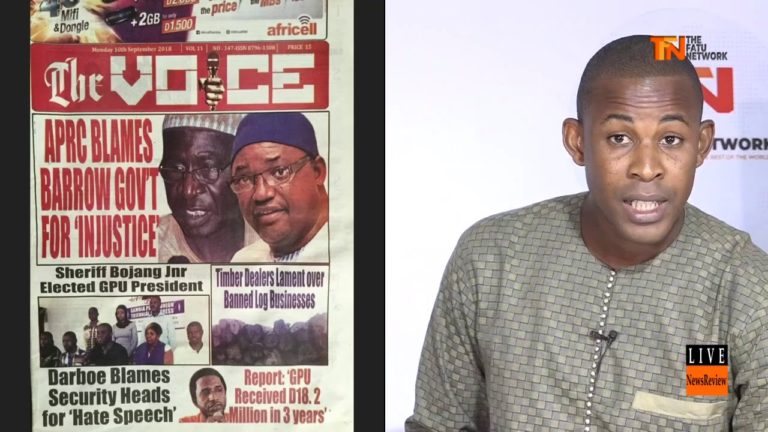

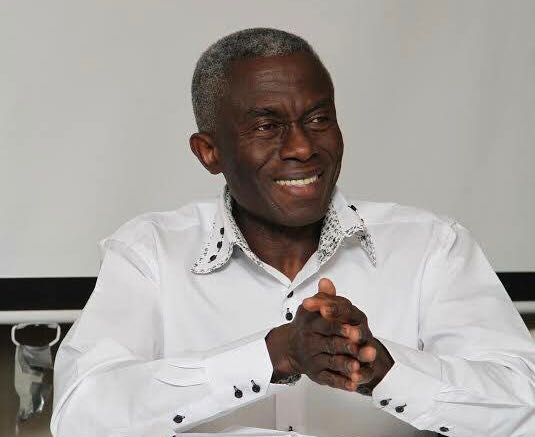
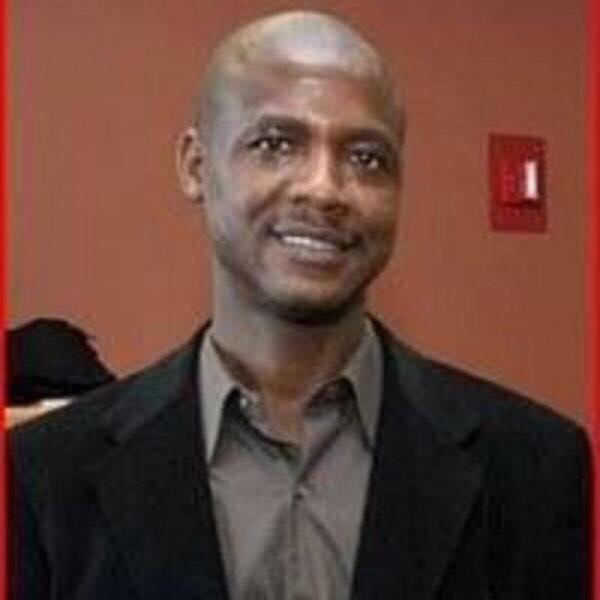

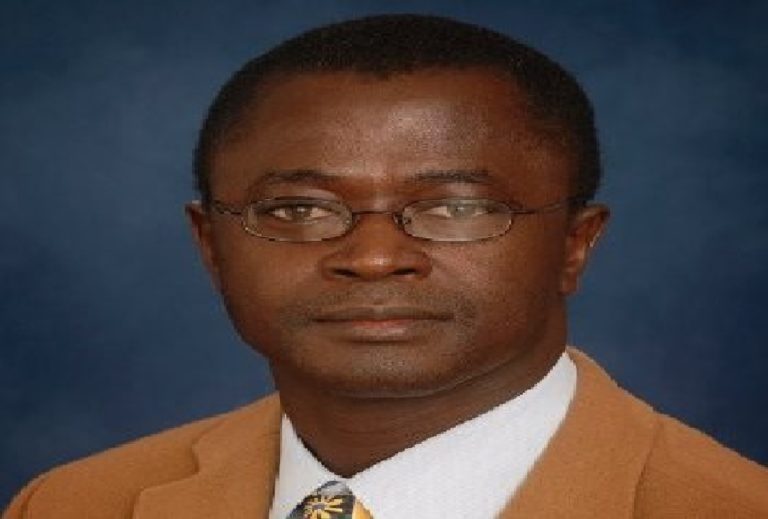
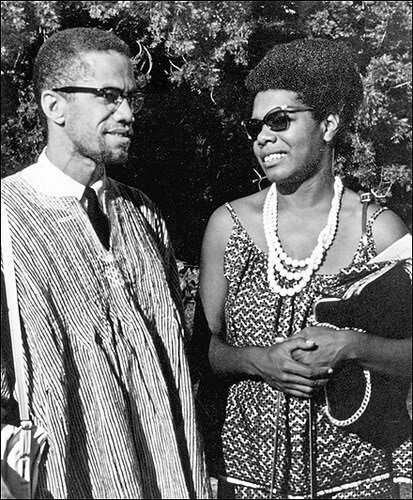
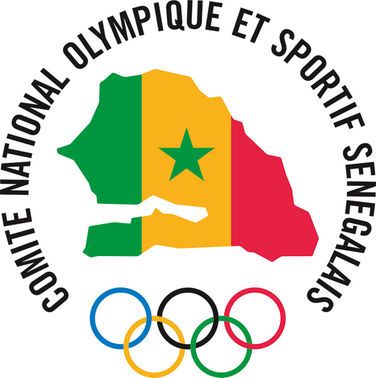
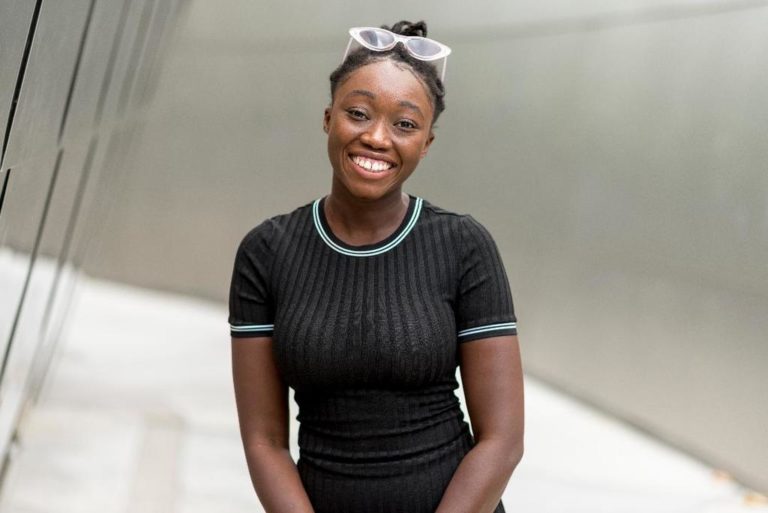


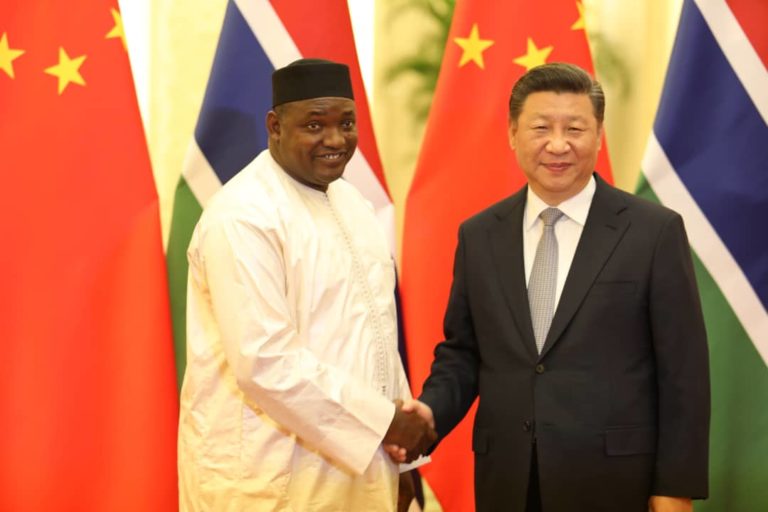
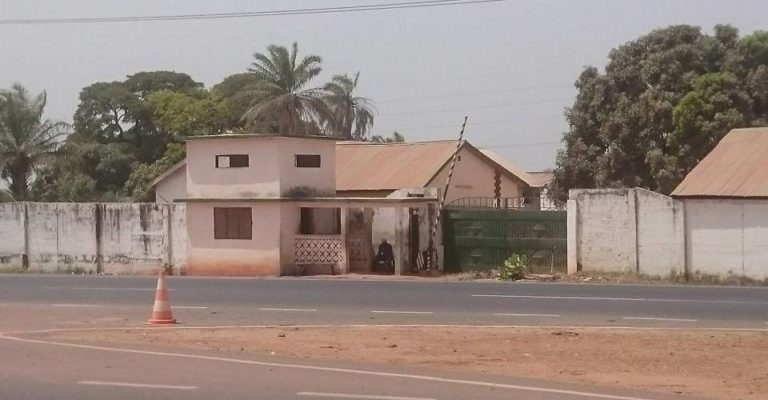

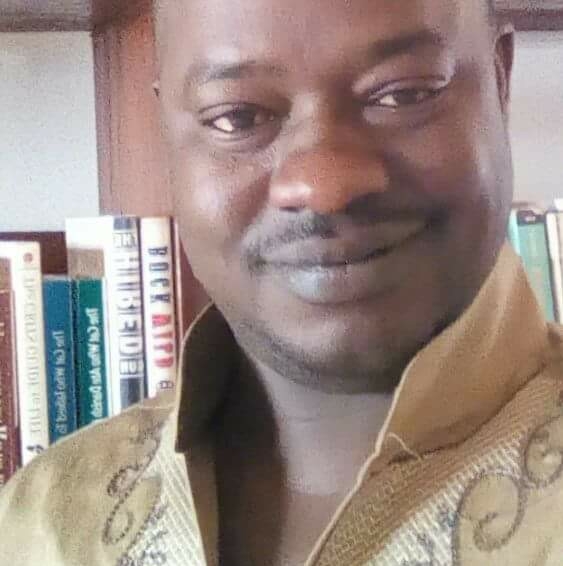

The Next Level in Holding Government to Account…
Since January 2017, we have seen the Barrow-led government stumble time and again. We have criticized, raised concerns – sometimes even protested – but it seems all efforts are falling on deaf ears. There seems to be a disconnect between the governors and the governed. We have repeatedly called for reforms but still no substantial changes have happened, or if they are happening also, at a very slow rate.
When it was announced on the Gambia Radio and Television Services that the president, His Excellency Adama Barrow had through his personal efforts donated fifty-seven vehicles to members of the National Assembly, there was a hullabaloo that it did not follow due process. The government came out to say that the vehicles were donated by an anonymous donor who did not wish to be named.
Then the other saga that hit the nation was when the president and a huge delegation travelled to New York to attend a meeting at the United Nation. There were complains that the delegation was too large and considering that we were complaining of a depleted economy, it was not wise to go with such a large delegation. We made all efforts to find out the number of people that the President travelled with but to no avail. The Ministry of Finance, the Ministry of Information, the Office of the president all failed to give us the right figure.
Not long ago, it was announced on GRTS that the president had donated eleven million dalasis to the 2018 batch of pilgrims. When there was an outcry, they modified it that it was actually a philanthropist in Saudi Arabia who gave it to the pilgrims and not the president. But again, it was said that he wants to remain anonymous. Citizens tried to get more information but like always the government remains tight-lipped.
All these point to some form of aloofness on the part of the government. They seem to ignore calls to meet the demands of the citizens and this is not healthy for a democracy especially a nascent one like we have. The National Assembly which should be the body that compels government officials to reveal the names of those who say they wish to remain anonymous is not doing this at all. Could it be that the fact that they were given vehicles is preventing them from holding the Executive to account?
All these problems – or most of them at least – could have been avoided had there been a Freedom of Information Act. The Gambia Press Union has worked assiduously to ensure that we have this Act. They worked with the Ministry of Information and then the Ministry of Justice, but it seems that the Ministry of Justice is dragging its feet. Why is it that since this government came into office, they cannot seem to put these things in order to ensure that all bad laws are repealed and laws which are democratic and friendlier to development are put in place?
The time has come for us to put an end to the anonymity when government is dealing with people who wish to give or spend huge amounts of money yet wish to remain unnamed. We have seen how political patronage encourages and promotes nepotism and corruption. The truth is that usually when people give money like that, it is because they are expecting to get something more in return.
Considering that we have been informed that we have oil of up to eight hundred and twenty-five barrels which will amount to up to D300 million dollars and that the European Union has pledged 1.7 billion Dollars to the Gambia, we should try by all means to ensure that we put the right institutions in place to make sure that when these funds come they will be put to good (the right) use. We have often seen countries in Africa who have oil end up having serious problems resulting in civil wars because the right institutions were not in place.
It is time for citizens to engage the government and insist on transparency and good governance.
Tha Scribbler Bah
A Concerned Citizen